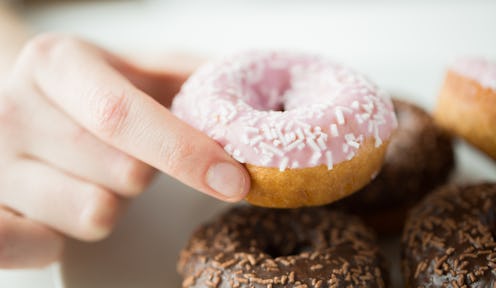
Ever get half-way through a bag of candy and wonder how you're still craving sugar? It turns out, there's a science behind your sweet tooth, and your cravings (probably) aren't abnormal. Accordinvg to a recent study, there's actually a cell in your liver that regulates your sweets preference. Basically, a hormone in your liver sends signals to your brain and either increases or decreases your sugar craving. Scientists found that a higher level of the hormone in question, FGF21, correspond with fewer sugar cravings. Pretty cool, right?
Research done by Monell and QIMR Berghofer Research Center reveals that genetic dispositions may affect how much of a sweet tooth you have, too. Danielle Reed, author of the study, clarifies that craving more sugar does not necessarily mean you are overindulgent, explaining, "Just as people born with a poor sense of hearing may need to turn up the volume to hear the radio, people born with weak sweet taste may need an extra teaspoon of sugar in their coffee to get the same sweet punch." Just how much variation do genes account for? This study finds that our genes account for roughly "30 percent of person-to-person variance in sweet taste perception."
Another interesting aspect of their findings? When it comes to evaluating sweetness, there does not appear to be a difference between sweetener from a natural sugar (such as fructose and glucose) or synthetic sweeteners (such as aspartame).
So, does it all come down to genes? Not everyone agrees. For example, Joseph Pinzone, M.D. and professor at UCLA, disagreed with the notion that genes are the sole determinant in where our sweet tooth comes from in an interview with Shape unconnected to this recent study. Pinzone argued that "when we are exposed to any stimulus like food, the chemistry in our brain changes in some way”; he explained that when we have positive associations with sweet food, such as candy or cake, at a young age, our brains grow to connect those things with love and happiness.
Of course, there's been a lot of research exploring just how addictive sugar can be, and some scientists argue that the more we consume it, the more we crave it. One study examined women's brain activity as they looked at photos of food (so basically, imagine scrolling your Instagram feed while hooked up to an MRI), and which foods made their brains light up the most? Sugary treats like milkshakes were the clear winner.
Another study, this one out of Princeton University, found that when rats were given small amounts of sugary water, they were just fine. But with the option to have sugary water on a daily basis? The pleasure and reward centers in their brains were buzzing with activity, and lo and behold, when they were denied the sugary water, they experienced shakes and tremors (which are, disturbingly, real signs of withdrawal). So feel free to enjoy sugar, of course — but proceed with caution. The crash after a sugar high is not a fun thing.